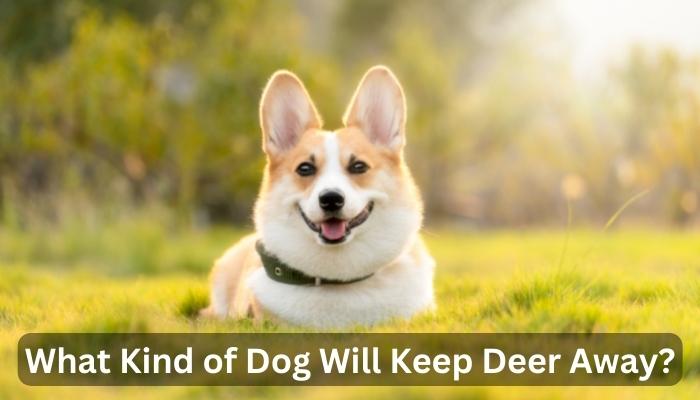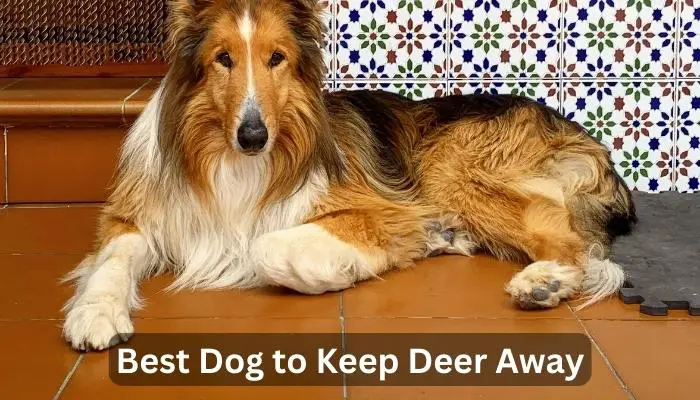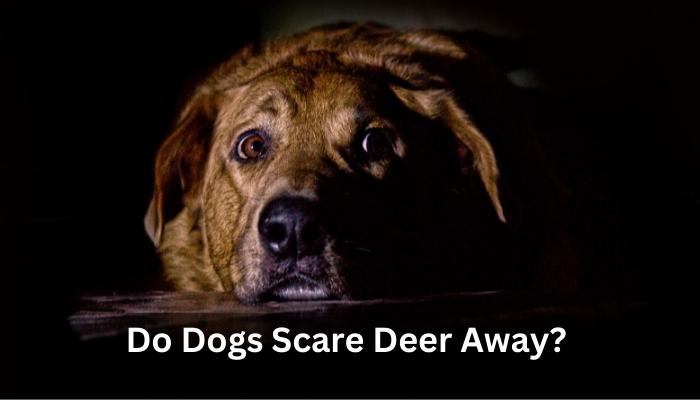Dogs are known for their ability to chase and hunt various animals. But, do they scare deer away? This is a question that many people ask, especially those who live in areas where deer are common. Some people believe that dogs can help control the deer population by scaring them away, while others think that dogs have no effect on deer behavior.
Research has shown that dogs can indeed scare deer away. This is because dogs have a natural predatory instinct that can make deer uncomfortable, causing them to flee the area. However, the effectiveness of dogs in deer control depends on several factors, such as the breed of dog, the dog’s training, and the deer population in the area.
Factors affecting dog-deer interactions include the size and breed of the dog, the dog’s behavior and training, and the deer’s familiarity with dogs. Some dogs, such as hunting breeds, may be more effective at scaring deer away than others. Additionally, dogs that are trained to hunt or chase may be more effective than those that are not. The familiarity of deer with dogs may also play a role in their behavior around dogs.
Contents
Key Takeaways
- Dogs can scare deer away due to their natural predatory instincts.
- The effectiveness of dogs in deer control depends on several factors, such as the breed of dog, the dog’s training, and the deer population in the area.
- Safety considerations for both dogs and deer should be taken into account when using dogs for deer control.

Do Dogs Naturally Scare Deer Away?
Deer are known to be shy and skittish animals that are easily spooked. Many hunters go to great lengths to hide their scent and themselves, sitting quietly in deer blinds and tree stands. But what about dogs? Do they naturally scare deer away?
According to experts, dogs and deer have a natural instinctual relationship that dates back to prehistoric times. Dogs are descendants of wolves, which were once one of the main predators of deer. As a result, deer have evolved to be wary of dogs and their scent.
Dogs have an innate predatory instinct that can make deer uncomfortable, which can cause them to flee the area. In fact, many hunters use dogs to track and flush deer out of hiding. However, it is important to note that not all dogs are effective at scaring deer away. Some dogs may be too friendly or lack the necessary training to effectively scare deer.
In addition to their predatory instinct, dogs can also scare deer away with their scent. Deer have a keen sense of smell and can detect the scent of a dog from a distance. This can cause them to become nervous and flee the area. Hunters often use scent blockers to mask their own scent, but dogs can still give away their position.
Overall, while dogs can naturally scare deer away, it is important to remember that not all dogs are effective at doing so. It takes a certain level of training and instinct for a dog to be an effective deer deterrent. Additionally, it is important to consider the potential impact of dogs on the natural habitat of deer and other wildlife.
Factors Affecting Dog-Deer Interactions

Dog Size and Breed
The size and breed of a dog can affect how it interacts with deer. Larger dogs may be more intimidating to deer and cause them to flee, while smaller dogs may be perceived as less of a threat. Some breeds, such as hunting dogs, may have a natural instinct to chase after deer, which could lead to a negative interaction. On the other hand, some breeds, such as herding dogs, may be trained to work with deer and help manage their movements.
Deer Species and Behavior
The species and behavior of deer can also affect how they interact with dogs. Some deer species, such as white-tailed deer, may be more skittish and easily frightened, while others, such as mule deer, may be more tolerant of dogs. Additionally, deer behavior can vary depending on the time of year and their life stage. For example, during the breeding season, male deer may be more aggressive and territorial, which could lead to a negative interaction with a dog.
Environmental Conditions
Environmental conditions can also play a role in dog-deer interactions. For example, deer may be more likely to approach or tolerate a dog in a suburban or urban area where they are accustomed to human presence. In contrast, in a rural or wild setting, deer may be more wary of dogs and perceive them as a threat. Additionally, factors such as weather, time of day, and season can also impact how deer respond to dogs.
Overall, there are several factors that can affect how dogs and deer interact with each other. It is important for dog owners to be aware of these factors and take steps to manage their dog’s behavior around deer to prevent negative interactions.
Effectiveness of Dogs in Deer Control
Dogs as Deer Deterrents
Dogs are often used as a means of controlling deer populations in certain areas. Many people believe that dogs are effective in scaring away deer due to their natural predator-prey relationship. According to Pet Dog Owner, dogs are predators, and deer are prey animals. Deer have a keen sense of danger, and they can smell and spot predators coming. Therefore, the presence of dogs can scare deer away, at least temporarily.
Anecdotal reports from people who have used guard dogs suggest that their presence can help keep deer out of gardens or other areas where they are unwelcome, according to Dog Ownership Guide. However, there isn’t much scientific evidence that dogs are an effective deterrent for deer.
Limitations and Challenges
Scare techniques, such as the use of dogs, are best used for short-term control of deer damage because deer can become habituated to them over time, according to the Maryland Department of Natural Resources. This means that the effectiveness of dogs in scaring away deer may decrease over time, as deer become more accustomed to their presence.
Moreover, the effectiveness of dogs in scaring away deer may depend on various factors, such as the breed of the dog, the size of the area to be protected, and the number of deer in the area. According to Seek for Pet, some dogs may be more effective than others in scaring away deer. For example, large dogs such as Great Danes or German Shepherds may be more effective than small dogs in scaring away deer.
In conclusion, the effectiveness of dogs in controlling deer populations may depend on various factors, and there isn’t much scientific evidence to support their effectiveness. However, anecdotal reports suggest that dogs can be effective in scaring away deer, at least temporarily.
FAQs
Does Having a Dog Keep Deer Away?
No, having a dog will not keep deer away. Deer are attracted to yards with food sources and hiding places, so even if you have a dog, you may still see deer in your yard. However, the presence of a dog may scare off some deer and make your property less attractive to them.
If you’re concerned about deer in your yard, the best thing to do is take away their food sources by keeping your lawn trimmed and free of fallen fruit or nuts. You can also try installing a fence around your yard.
Does the Smell of a Dog Bother Deer?
No, the smell of a dog does not bother deer. In fact, deer are often attracted to the scent of dogs. Dogs are predators, and their scent can trigger a deer’s natural instinct to flee.
However, if a deer is habituated to the presence of dogs, it will not be as fearful and may even approach them.
Does Dog Poop Scare off Deer?
No, dog poop does not scare off deer. In fact, deer are attracted to the scent of dog feces because it contains the nutrients they need. However, if you have a problem with deer raiding your garden, there are other things you can do to deter them, such as installing a fence or using repellents.
Conclusion
In conclusion, dogs can scare deer away, but it depends on several factors. Dogs are natural predators, and deer are prey animals. As such, deer have a keen sense of danger and can smell and spot predators coming.
Some dogs may be more effective at scaring deer away than others. For example, hunting dogs that are trained to chase and retrieve game may be more effective at scaring deer away than lap dogs that are not trained for hunting. Additionally, the size and breed of the dog may also play a role in how effective they are at scaring deer away.
It’s important to note that not all deer will be scared away by dogs. Some deer may be more tolerant of dogs than others, and some may even become aggressive if they feel threatened. Additionally, other factors such as the time of year, the location, and the presence of other predators may also affect whether or not dogs are effective at scaring deer away.
Overall, while dogs may be able to scare deer away in some situations, they are not a foolproof method for keeping deer out of an area. Other methods such as fencing, repellents, and planting deer-resistant plants may be more effective in deterring deer from an area.

